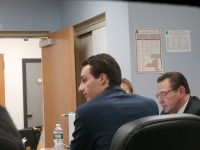High Stakes Removal Hearing Held in Carmel

A hearing to determine the fate of Carmel Board of Education member John Curzio was held last Wednesday, with the issue of free speech seemingly at odds with appropriate school board conduct.
The removal hearing, which was public, lasted for more than two hours with attorney Mark Rushfield representing most of the school board that accused fellow trustee of two misconduct charges, and attorney Michael Sussman representing Curzio, a 20-year-old college student who graduated from Carmel schools.
In a 5-2 vote last month, the board approved a hearing to determine if Curzio committed misconduct when he vocally opposed two bond votes that ultimately failed on Dec. 11. The two bonds, meant to make massive improvements across the district, would have cost $85 million, though state aid would have offset some of the costs to local taxpayers.
Attorney Jeffrey Selchick presided over the hearing and will reach a decision regarding Curzio’s conduct likely in March.
During opening statements, Rushfield argued Curzio violated his oath of office and claimed that he used public resources for a private purpose when he spoke out against the bonds during videotaped board meetings.
“The law establishes although an individual board member is entitled to express his views about issues concerning the district, may not use public funds such as videotaping of a board meeting made available to the community to persuade members of the community to vote a certain way,” Rushfield said.
But Sussman called the hearing against Curzio an “outrageous attempt to suppress opinion.”
Sussman said board members never expressed their concern about Curzio’s statements following the Nov. 21 or Dec. 5 meetings and didn’t accuse him of misconduct until after the bonds failed. Curzio, when stating his opinion about the bond vote, clarified he was speaking for himself and not for the school board, Sussman said.
“My client did nothing contrary to what others did,” said Sussman, noting the district created a video about the capital projects and board members spread it throughout the community.
Sussman said Curzio has a responsibility to assert his position to the community and the rest of the board is using him as a “scapegoat” for the defeat of the bond propositions. During meetings that are videotaped, Sussman said every member had the opportunity to state their opinion and it wasn’t Curzio’s decision to spread the video of the meetings to the community.
“I believe this sort of oppressive behavior should be stopped,” Sussman said. “Right here, right now.”
About a dozen residents attended the hearing, including Curzio’s parents, Kent Supervisor Maureen Fleming, Kent Councilman Paul Denbaum, Southeast Supervisor Tony Hay, and former Carmel school board members Eric Mittelstadt and Joe DiVestea.
Superintendent of Schools Andy Irvin testified on behalf of the school board and said Michael Lambert, an attorney for the district, met with the school board during a special meeting in August explaining that board members can’t attempt to sway voters when a budget or bond vote is on the ballot and can only disseminate factual information. Irvin also relayed that Lambert told board members they could make statements about budget and bond votes if they prefixed that it was as a private citizen.
“Although you never give up your right to free speech, you need to identify something as your own personal opinion not that of the school board or your service as a school board member,” Irvin recalled Lambert counseling the board.
After prodding by Sussman, Irvin acknowledged no board member or district official spoke to Curzio about possible violations once he spoke out at those two meetings about the bonds. Irvin said the DVDs that videotaped Curzio’s comments were still circulated to the community and his comments weren’t edited out.
Curzio testified on his behalf and said when he spoke out against the approved budget last year, no board member or district official told him his actions were inappropriate. At the August special meeting, Curzio said Lambert advised school board members had to specify they were speaking in a personal capacity if they voiced an opinion.
Curzio said he shared his opposition on the bond using social media, yard signs, handouts, talking to voters, and attending two town board meetings in Kent. During that campaign, he said he tried to deliver factual information and emphasized what his opinion was. Curzio added he was not approached by his colleagues about his methods or conduct during meetings.
A video that the district created about the bonds was played at meetings and was on the district website, Curzio said, noting it was paid for by taxpayer funds. He later testified the video didn’t explicitly tell voters to vote yes, but started with the line, “It’s time,” which Curzio believes encouraged voters to support the bonds.
“As an elected official I believe you have a responsibility to express your opinion on various items that come before the board that are up for a vote and discussion,” Curzio said. “I was very careful to demonstrate that they were my personal opinions.”
In a more combative back and forth between Curzio and Rushfield, Curzio confirmed he encouraged voters to turn down the referendum as a board member sitting on the dais during those two meetings. He said he never read he wasn’t allowed to in a school education law book and didn’t make an inquiry to the rest of the board or district to see if he could make those comments.
“I believe the comments were proper,” Curzio said.
When asked why he thought he could make comments about the school bonds at meetings, Curzio’s retort was: “the 1st amendment to the Constitution.”
Both Rushfield and Sussman have until the end of February to submit more information and Selchick will then determine if the alleged misconduct holds any weight.
